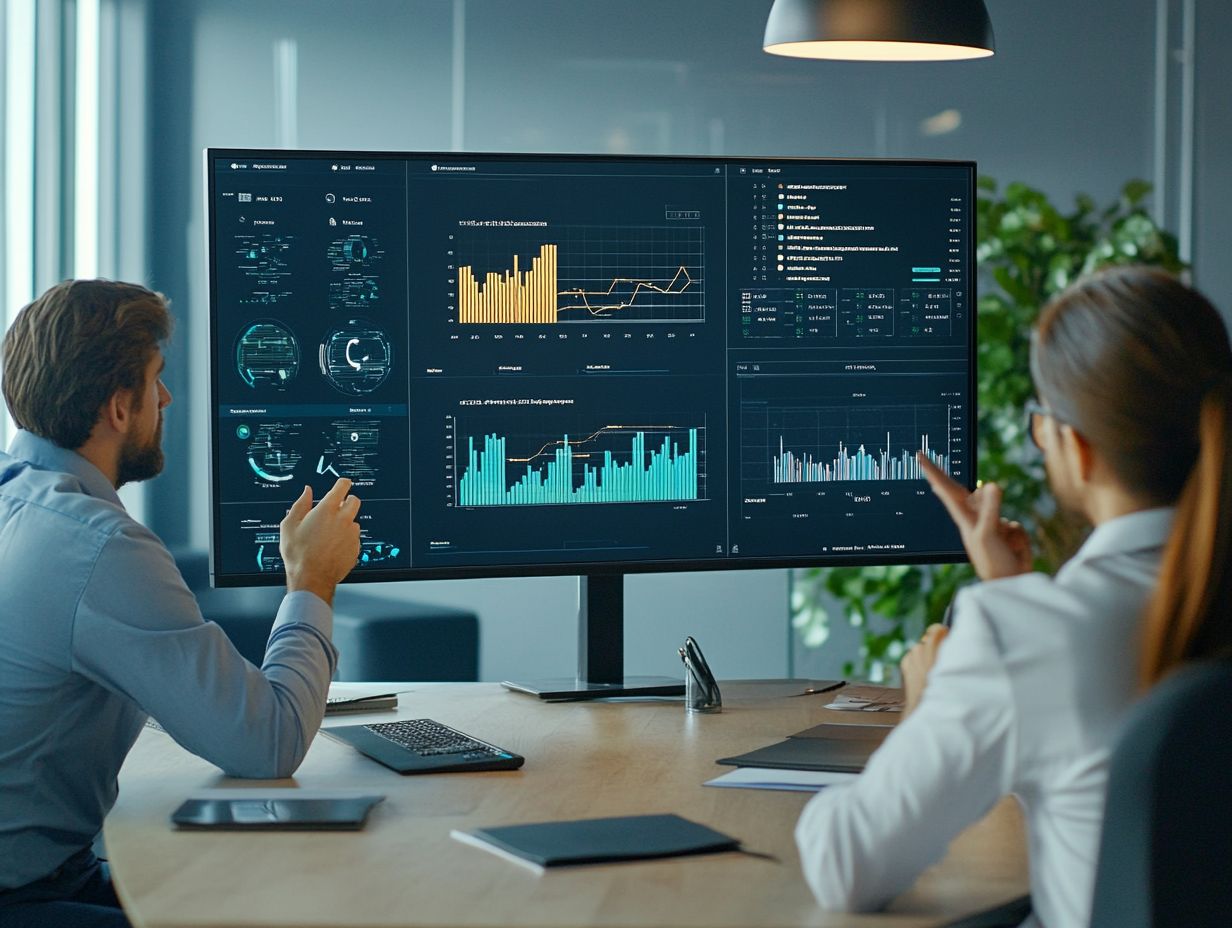5 essential insights on managed security services
In today s digital landscape, businesses face a growing array of cybersecurity threats that can jeopardize their operations. Managed Security Services provide proactive solutions to safeguard sensitive data and ensure compliance with industry standards.
This article explores Managed Security Services, highlighting their benefits, types, and key features of effective providers. You will discover essential factors to consider when selecting a Managed Security Service Provider, navigate common challenges, and explore the latest trends shaping the industry.
Get ready to take charge of your cybersecurity strategy and protect your business from potential threats!
Contents
- Key Takeaways:
- 1. Understanding Managed Security Services
- 2. Benefits of Using Managed Security Services
- 3. Types of Managed Security Services
- 4. Factors to Consider When Choosing a Managed Security Service Provider (MSSP)
- 5. Common Challenges and Risks of Managed Security Services
- How Can Managed Security Services Help Businesses?
- What Are the Key Features of a Good Managed Security Service Provider?
- How Can Businesses Ensure Data Security with Managed Security Services?
- What Are the Costs Associated with Managed Security Services?
- What Are the Latest Trends in Managed Security Services?
- How Can Businesses Stay Ahead of Cybersecurity Threats with Managed Security Services?
- Frequently Asked Questions
Key Takeaways:

Managed Security Services provide businesses with expert security solutions and round-the-clock monitoring to protect against cyber threats. They can save you money while keeping your business safe, offer advanced threat detection, and give you access to the latest security technologies. When choosing a managed security service provider, consider their experience, reputation, and customizable solutions.
1. Understanding Managed Security Services
Managed Security Services offer comprehensive cybersecurity solutions designed to protect digital assets against evolving threats. With specialized services and technical expertise tailored to your needs, these solutions establish a robust security framework that includes threat detection, incident response, and compliance monitoring.
In today’s fast-paced digital environment, implementing advanced security architectures is essential to defend against sophisticated attacks. MSS integrates risk mitigation strategies and continuous monitoring, ensuring proactive measures identify and neutralize threats before they escalate.
Managed Security Service Providers are crucial in this ecosystem, offering the expertise needed to navigate complex cybersecurity regulations. By leveraging cutting-edge technologies and best practices, these providers empower you to focus on core operations while staying ahead of security concerns, especially when considering the key features of effective managed security services.
2. Benefits of Using Managed Security Services
Utilizing Managed Security Services brings many benefits that organizations can’t overlook. You will experience enhanced operational efficiency and access to specialized cybersecurity strategies. For instance, here are 5 tips for choosing managed security services that ensure ongoing monitoring strengthens defenses against emerging threats.
This approach streamlines security protocols while allowing you to respond effectively to evolving cyber risks. With high-availability capabilities, these services keep your protection uninterrupted, even during heightened activity or potential threats.
You have the agility to adapt your security measures to meet specific compliance requirements and business objectives. In a constantly shifting cyber threat landscape, leveraging managed security services equips you with strategic foresight, empowering you to concentrate on growth while entrusting your security needs to capable hands.
3. Types of Managed Security Services

Managed Security Services offer various solutions to meet different cybersecurity needs. These include vulnerability management, incident response, cloud security, and threat detection, ensuring strong data protection and compliance.
Each service plays a vital role in building a strong cybersecurity posture. Vulnerability management identifies and addresses weaknesses in your systems, keeping you ahead of threats.
Incident response acts as a safety net. It ensures quick containment of breaches to reduce damage and downtime.
Cloud security solutions provide tools to protect data in cloud environments. Access controls limit who can access sensitive information, enhancing your defenses.
A well-established Security Operations Center (SOC) is essential. It monitors, detects, and responds to threats in real time.
4. Factors to Consider When Choosing a Managed Security Service Provider (MSSP)
Choosing the right Managed Security Service Provider (MSSP) requires meticulous evaluation of key factors. These include technical expertise, compliance monitoring capabilities, and the ability to meet your specific cybersecurity needs through effective service-level agreements.
Consider the MSSP’s operational focus. Their practices should be tailored to your organization’s unique needs.
Investigate their track record with customer references to gain insights into reliability and service quality. Assess a vendor’s ability to adapt to changing compliance regulations, as this is crucial for mitigating risks.
Engaging in a thorough vendor evaluation process empowers your organization to make informed decisions, ultimately enhancing your overall security posture.
5. Common Challenges and Risks of Managed Security Services
While Managed Security Services offer significant benefits, they come with challenges and risks. You may face potential security incidents, the ongoing need for risk mitigation, and the balance between service flexibility and your internal security team’s capabilities. Understanding the 5 essential tools for managed security services can help navigate these challenges effectively.
Organizations today are confronted with escalating security challenges that can quickly outpace existing resources. As cyber threats evolve rapidly, integrating effective cybersecurity knowledge with robust security tools is vital.
Your business must assess the effectiveness of your internal security team compared to the capabilities offered by Managed Security Services. This integration not only mitigates risks but also strengthens your organization’s resilience against incidents.
By fostering a culture of continuous learning and threat awareness, you can build stronger defenses. Ensure that both your internal teams and external services work together to tackle the complexities of today s cybersecurity landscape.
How Can Managed Security Services Help Businesses?

Managed Security Services can significantly boost your business’s operational efficiency. They deliver expert incident response, robust data protection, and proactive threat detection.
This ultimately leads to the ability to recover from cyber threats and a stronger security posture.
By leveraging these services, you can streamline your security protocols. This allows for more effective resource allocation and enables you to focus on your core business operations.
Keeping up with regulations becomes easier, ensuring that you meet essential requirements while also protecting sensitive information.
With the ability to respond swiftly to potential incidents, you minimize downtime and mitigate the impact of threats. This fosters a culture of preparedness and agility.
In a landscape where cyber threats are becoming increasingly sophisticated, this strategic support is essential for your success. It gives you the power to navigate challenges with confidence and resilience.
What Are the Key Features of a Good Managed Security Service Provider?
Key features of an exceptional Managed Security Service Provider (MSSP) include unmatched technical expertise, comprehensive security measures, and 5 key indicators of quality managed security services with continuous monitoring capabilities.
These are all backed by positive customer references and customized cybersecurity strategies that align with your unique organizational needs.
An effective MSSP leverages a deep understanding of current threats and trends in the cybersecurity landscape. This ensures that you are not only protected but also proactively safeguarded against emerging risks.
Their technical expertise goes far beyond simple incident response; they also provide a holistic approach that integrates advanced tools and methodologies.
Continuous monitoring is crucial. It enables the provider to detect anomalies in real-time and facilitate a swift response to potential breaches.
Customer references give you reliable evidence of the MSSP s effectiveness, instilling confidence that your chosen partner can deliver robust security tailored specifically to your operational complexities.
How Can Businesses Ensure Data Security with Managed Security Services?
You can ensure data security for your business through Managed Security Services. Implement robust protection measures such as encryption standards and access controls.
It’s crucial to adhere to regulatory requirements while focusing on risk mitigation through continuous cybersecurity education. By prioritizing these elements, you foster a proactive security posture that protects sensitive information and cultivates customer trust.
Regular risk assessments are essential. They allow you to pinpoint vulnerabilities and adjust your strategies as needed.
Investing in employee training guarantees that every team member understands their role in maintaining data security.
Utilizing multi-factor authentication and conducting regular software updates can significantly bolster your protection measures.
As the cyber threat landscape continues to evolve, staying informed about the latest best practices and compliance requirements will ensure that your data remains secure against potential breaches.
What Are the Costs Associated with Managed Security Services?

Understanding the costs associated with Managed Security Services requires a nuanced analysis. This considers service flexibility, service-level agreements, and the potential for enhanced operational efficiency through specialized services tailored to your organization’s specific needs. It’s also important to recognize 5 signs it’s time for managed security services to ensure you are making informed decisions.
The complexity of pricing models can vary significantly. This is influenced by the range of service offerings and the level of customization you require.
For example, you might choose a basic package that provides essential security measures, or invest in advanced, highly specialized services that offer greater protection albeit at a premium cost.
Different tiers of service-level agreements can dictate response times and support availability, further impacting your overall pricing.
As you navigate these options, it s essential to weigh these factors against your own risk profile and operational requirements. This will help you arrive at a solution that balances cost with critical security needs.
What Are the Latest Trends in Managed Security Services?
The latest trends in Managed Security Services reveal an evolving landscape. Emerging threats demand advanced cybersecurity strategies. You’re likely noticing a growing reliance on cloud security solutions and AI integration for high-availability security, as well as the importance of understanding the 5 features every managed security service should have.
As you navigate this complex environment, it becomes essential to adopt innovative technologies to strengthen your defenses. The shift towards cloud security transcends merely storing data securely; it s about building a flexible and scalable framework that adapts to real-time threats.
By leveraging the powerful analysis capabilities of AI, you can automate threat detection and response. This gives the power to your security teams, allowing them to concentrate on more strategic initiatives. This proactive approach not only bolsters resilience against current threats but also prepares you for future challenges, paving the way for a more secure digital landscape.
How Can Businesses Stay Ahead of Cybersecurity Threats with Managed Security Services?
To stay ahead of cybersecurity threats, leverage Managed Security Services by adopting proactive measures tailored specifically to your unique threat landscape. Consider asking your provider the 5 questions to ask your managed security service provider to enhance your incident response capabilities and strengthen your overall security posture.
Employing continuous monitoring and threat intelligence helps you identify vulnerabilities before they become a problem. Customized training workshops for your employees will raise awareness about phishing attempts and social engineering tactics common entry points for attackers.
This holistic approach emphasizes prevention and ensures that, when an incident does occur, your response teams are well-equipped to mitigate damage swiftly and efficiently.
By prioritizing these strategies, you empower your business to tackle modern cyber challenges confidently and successfully!
Frequently Asked Questions
What are managed security services?
Managed security services are outsourced security services provided by a third-party provider. These services include monitoring, managing, and responding to security threats and incidents for an organization.
What are the benefits of utilizing managed security services?
There are several benefits to using managed security services, including:
- Provide 24/7 monitoring and protection against cyber threats
- Access expert security professionals and technology
- Achieve cost savings compared to hiring and maintaining an in-house security team
- Ensure scalability to meet the changing security needs of your organization
- Enable real-time threat detection and response
What are the essential insights on managed security services?
The 5 essential insights on managed security services are:
- Managed security services provide comprehensive protection for your organization.
- They offer round-the-clock monitoring and response to security threats.
- Managed security services can be tailored to fit the specific needs and budget of your organization.
- They provide access to advanced security technologies and expertise.
- Using managed security services can result in cost savings for your organization.
How do managed security services differ from traditional security measures?
Traditional security measures such as firewalls and antivirus software are designed to protect specific network assets. Managed security services, on the other hand, offer a more comprehensive and proactive approach to security by continuously monitoring and managing your organization’s security.
What types of organizations can benefit from using managed security services?
Organizations of all sizes and industries can benefit from using managed security services. Small businesses can benefit from the expertise and cost savings, while larger organizations can benefit from scalability and 24/7 monitoring and response capabilities.
How do I choose the right managed security services provider for my organization?
When choosing a managed security services provider, consider their experience, expertise, and the specific services they offer. It’s also important to ensure they have a proven track record of successfully protecting their clients’ networks and data. For guidance, you may want to explore 5 managed security services you should consider and ask for references while reading reviews from other organizations that have used their services.






